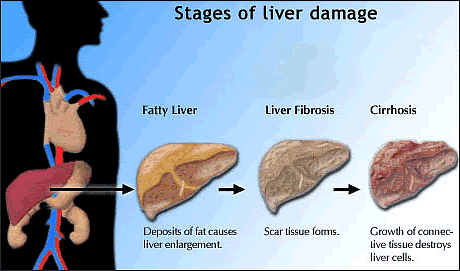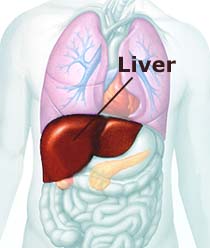Blood
Pressure Drug Losartan Associated with Liver Fibrosis Regression in Small Study By
Liz Highleyman | Losartan,
a drug usually used to manage high blood pressure, may improve liver fibrosis
-- a common outcome of chronic hepatitis B or C -- according to a recent small
study. |
Over
years or decades, chronic viral hepatitis and a variety of other causes can cause
fibrosis, or accumulation of fibrous scar tissue produced by support cells in
the liver. Fibrosis may progress
to cirrhosis and end-stage liver
failure, and may trigger hepatocellular
carcinoma. While antiviral therapy can slow or halt liver disease progression,
there is currently no treatment that can reliably reverse or "cure"
advanced fibrosis. 
Fiona
Oakley and colleagues from the U.K. sought to better understand the pathways underlying
fibrosis and its potential for reversal. Results of their study were published
in the June
2009 issue of Gastroenterology. A
transcription factor called nuclear factor kappa-B (NFkB) promotes survival of
myofibroblasts (cells that produce collagen and other scar material) and promotes
fibrogenesis through mechanisms that are poorly understood, the authors noted
as background.  In
a laboratory study using rat and human liver tissue, the researchers investigated
the activity of 2 natural cytokines -- angiotensin II and IkB kinase (IKK) --
that regulate NFkB activity, and their role in promoting fibrosis. They also conducted
a small clinical trial to assess whether losartan (Cozaar), an angiotensin-converting
enzyme (ACE) inhibitor that interferes with the activity of angiotensin II, might
reduce liver fibrosis. In
a laboratory study using rat and human liver tissue, the researchers investigated
the activity of 2 natural cytokines -- angiotensin II and IkB kinase (IKK) --
that regulate NFkB activity, and their role in promoting fibrosis. They also conducted
a small clinical trial to assess whether losartan (Cozaar), an angiotensin-converting
enzyme (ACE) inhibitor that interferes with the activity of angiotensin II, might
reduce liver fibrosis.
In
the laboratory study, the authors demonstrated that ACE and IKK inhibitors led
to regression of fibrosis in diseased rodent livers. When accumulation of new
fibrotic tissue is halted, existing scar tissue is not replaced after it naturally
deteriorates, resulting in reduced fibrosis. The
open-label clinical trial included 14 chronic hepatitis C patients with advanced
liver fibrosis (Metavir stage F2 or higher) but no history of decompensation.
Participants received 50 mg/day losartan for 18 months.  Tests
of paired pre- and post-treatment biopsy samples revealed that half the patients
initially had high levels of NFkB, but these fell after losartan administration.
Furthermore, treatment with losartan led to a reduction of fibrotic tissue build-up
in these participants. Tests
of paired pre- and post-treatment biopsy samples revealed that half the patients
initially had high levels of NFkB, but these fell after losartan administration.
Furthermore, treatment with losartan led to a reduction of fibrotic tissue build-up
in these participants.
"This
early stage trial has shown that we can shrink liver scarring in some patients
and shows promise for a treatment that could make a huge difference to the lives
of thousands of people," said coauthor Derek Mann of Newcastle University.
He noted that biopsies might enable clinicians to predict which individuals might
benefit from losartan or similar therapies. The
investigators plan to conduct further research involving patients with liver disease
due to non-viral causes such as heavy alcohol use, genetic factors, and autoimmune
diseases.
Institute of Cellular Medicine, Newcastle University, Newcastle
upon Tyne, UK; University of Southampton, Southampton, UK; Institut Clínic
de Malalties Digestives i Metabòliques, Hospital Clínic, Institut
d'Investigacions Biomèdiques August Pi i Sunyer, Barcelona, Spain; University
of Queensland, School of Medicine, Princess Alexandra Hospital, Queensland, Australia;
Laboratory of Molecular and Cellular Biology, University of Crete Medical School,
Crete, Greece.
6/19/09 References
F
Oakley, V Teoh, G Ching, and others. Phosphorylation of RelA at Ser536 to Promote
Myofibroblast Survival and Liver Fibrosis. Gastroenterology 136(7). 2334-2344.e1.
June 2009.
M Pinzani. Unraveling the spider web of hepatic stellate cell
apoptosis. Gastroenterology 136(7). 2061-2063. June 2009.
|